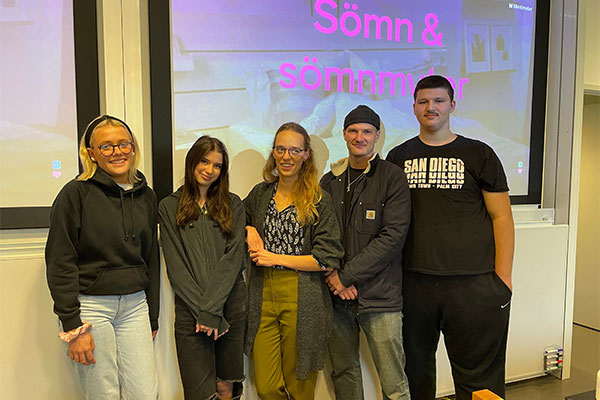What happens when you look at your mobile before you fall asleep? How does sleeping too little or too little affect the body? What should you do if you can't fall asleep? Can we make up for lost sleep?
Lieve van Egmond, a research student at the Department of Surgical Sciences and Pharmaceutical Biosciences, gave a presentation and asked questions that students could answer via Mentimeter, an interactive educational tool for polling in class. Enthusiasm was high and there were many discussions in the room before the correct answer was revealed and Lieve gave a more thorough explanation of the answer.
“For me, it was also a visit to the university when I was in high school, which led me into research, Lieve says. I want to make students curious about what is going on here at the university and maybe create an interest in research. Sleep affects us all! It's important to know how small life changes can make such a big impact on our sleep patterns and our health. The students' questions also help me gain different perspectives on my research area.”
Why is it so important to get a good night‘s sleep?
“My biggest advice to young people is definitely not to look at their mobile phone before they fall asleep,' emphasises Lieve van Egmond. We've clearly seen how poorly people sleep if they've looked at social media beforehand, because it has such a big emotional impact. By not getting into deep sleep and therefore sleeping poorly or too little, the very next day, people become more impulsive, may feel sad or have difficulty concentrating. Long-term sleep deprivation destroys the brain. Metabolism and the immune system are adversely affected and the risk of developing brain diseases such as Alzheimer's increases significantly.”
Inspiration and curiosity
One of the university's missions, in addition to education and research, is to interact with the wider community. An important part of this is to provide information about its activities and new research findings so that everyone can benefit, including through school visits. Another important element is that collaboration can often inspire new ideas in research and education. Today's visit to the BMC was attended by 250 students. The first lecture seemed to be appreciated by the students, who were mainly from years 1 and 2 of Grillska Gymnasium.
“It's fun to do something other than just being at school and also to come here and learn new things," says Amelia Holmgren. “I especially appreciate the fact that we got to be so involved and answer questions about what we thought was true or false about the different sleep myths.”
“I knew that you shouldn't look at your mobile phone before you fall asleep and that you shouldn't drive when you're tired, but not all the parts about how sleep really affects your body and health," continues Emelie Meijer. It was also good to know that you can catch up on sleep if you had a bad night's sleep.
“I want to do this again, it was great fun!" says Mahmoud Alrahmon, before they leave the room and head for their next visit.”
Health Week
“We organise a Health Week every year at Grillska Gymnasiet in Uppsala to give our students a few days of extra health focus," says Henning Hedman, a social pedagog at Grillska Gymnasiet and one of the initiators of the visit. The days will include various lectures and workshops on routines, community safety nets and support services, tobacco, addiction, sleep, relationships and sexuality.
“We want the students to feel that they are important and that their health is important. We believe that there are important aspects of health in students' lives that affect the school and their well-being in general that are not covered in regular classes. This is a way to give them some of that and also hopefully some fun days that break patterns and create motivation throughout the activity.
“I hope that we can continue to collaborate with Uppsala University on sleep and perhaps other exciting topics, and that we can bring something useful to the school during the sleep lecture," says Henning Hedman.
